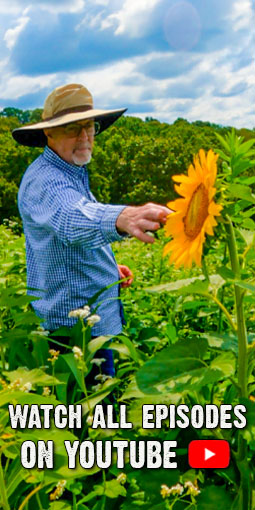Kansas Turkey Hunt: Lindsey’s Longbeard (Episode 185 Transcript)
This is the video transcript. To watch the video for this episode click here.
GRANT: June 3rd, Heath and Lindsey slid out to Kansas for one last late season turkey hunt. While here at The Proving Grounds, I’ve been trapping a few groundhogs and removing roses to protect food plots.
ANNOUNCER: GrowingDeer.tv is brought to you by Bass Pro Shops. Also by Reconyx, Trophy Rock, Muddy Outdoors, Non-Typical Wildlife Solutions, Eagle Seed, Nikon, Winchester, Redneck Hunting Blinds, Dead Down Wind, Record Rack, Antler Dirt, LaCrosse Footwear, ScentMaster, BloodSport Arrows, and Prime Bows by G5.
LINDSEY: Hey guys, it’s Lindsey. Um, Heath and I are on the road. It’s May 16th. We’re heading up to Kansas. Now, if you remember, about a month ago or so, Heath went up to Kansas and actually tagged out with two turkeys but I didn’t get to go on that trip and I’m planning on getting a turkey down this weekend.
GRANT: During the first day of Heath and Lindsey’s hunt in Kansas, they certainly had some toms responding, but it seemed like they were all hung up with hens.
GRANT: Although the GrowingDeer Team rarely misses an opportunity to take a fawn nabber out, Heath and Lindsey didn’t know the regulations of taking a coyote on turkey tags in Kansas, so they wisely passed the opportunity.
GRANT: They could hear some birds from that location, but it was obvious the birds were not coming in, so they decided to up and move and be very aggressive on their last day.
HEATH: (Whispering) (Inaudible) running. It’s a longbeard.
HEATH: (Whispering) Kill it.
LINDSEY: (Whispering) Two times. Yee-haw. Man he was intent. He was intent on that decoy. Of course he came running in at it.
HEATH: I see him too down the hill right there. Then all the sudden I’m zoomed in and all the sudden my screen is just full of this bird because he comes running around the corner and he’s right in the screen he’s like, golly holy cow.
HEATH: A Winchester baby number 2-3/4”.
LINDSEY: Did the job.
HEATH: Winchester twelve gauge knocked him down. He didn’t even flop. I mean good grief.
HEATH: Man, look at the hooks on that bird. Hold him still for a second.
LINDSEY: He’s a big guy.
GRANT: Any successful turkey hunt is fun but when you can enjoy that with a spouse or loved one, well that takes the whole experience to a whole new level.
GRANT: Heath and Lindsey returned to Arkansas to work on food plots and that’s exactly what I’ve been doing here at The Proving Grounds.
GRANT: The work I did on food plots this past week may not be what you expect.
GRANT: I wasn’t using the tractor, or a hand spreader. I was using my Duke cage traps.
GRANT: This groundhog has done a lot of damage, financial damage. We put a lot of time in preparing this food plot, fertilizing, getting it right for all the species to benefit, not one little hog, if you will, not one little greedy species that browses soybeans when they’re so small, they may not recover.
GRANT: As with most species, it’s about finding a balance. I like groundhogs and seeing ‘em every now and then. But when they’re doing massive damage, hurting me financially, and impacting the ability for other animals to get enough forage, I need to bring that balance back in shape by removing some groundhogs.
GRANT: I’m simply using the same cage trap I used during the winter to catch raccoons.
GRANT: A little different, I bait it with cantaloupe and one of the biggest secrets I’ve found to be successful at trapping groundhogs is being as close to their den as you can, the hole is back here just four or five feet. There’s an obvious trail come through the vegetation. I set this trap right where the trail enters the field and in one night I produced a groundhog.
GRANT: Groundhogs don’t move at night, they’re predator defense is being very vigilant, watching all the time, foraging during the day, and staying in their den at night. So running your traps early morning or late, late afternoon is best when trapping for groundhogs because middle of day is when they’re active and you don’t want to disturb the area at that time.
GRANT: I enjoy hunting groundhogs. They’re very sensitive to wind, like deer, and it can really be a good tune up for deer season but just like predators, the most effective way to remove a bunch of groundhogs is by trapping. Save those hunting times for recreation with your family.
GRANT: Groundhogs are herbivores, of course, and they’re very tasty. The ones that we don’t consume for our family, I’ve got a neighboring family over here that will eat every groundhog we can catch, so there’s nothing going to waste, and we hope to remove several groundhogs throughout the summer, here at The Proving Grounds.
GRANT: One of the things I really like about these little Duke Traps, is this metal shield right here; allows me to pick it up and move the animal off site to dispatch it so I can catch another groundhog here without fear of his claws coming through the wire or something and maybe giving me an infection.
GRANT: As always, I like these little Winchester subsonics for dispatching animals. Very quiet, don’t need a really strong bullet for just close range work, just enough to cleanly and humanely dispense the animal, keep the noise level down to protect my hearing and not disturb other animals in the area.
GRANT: It takes energy to trap groundhogs just like it does any furbearer species. Most states require a 24 hour or daily check of your traps, but by ignoring a groundhog problem, your hard work can disappear in literally a matter of weeks as they can clean a whole food plot.
GRANT: So, we’ve got ten pounds total for an eight pound groundhog. And I got to tell ya, an eight pound groundhog can do a lot of damage to a food plot.
GRANT: That’s enough, Garrett.
GRANT: Multiflora rose is a common plant throughout wildlife areas. It was introduced years ago as a growing fence or a hedge that was less expensive and easier to maintain than stretching barbwire across the prairie. In just a period of a couple of years, entire hillsides or pastures can be overtaken by multiflora rose which is extremely difficult and expensive to control.
GRANT: We’ve noticed it getting larger and spreading, and you can tell how it’s impacting this food plot by obviously removing moisture even in a wet year and limiting the soybean growth right here.
GRANT: One technique to control multiflora rose is to spray 80 or 90 percent of the growing area to green leaves with glyphosate or generic roundup. This technique is very effective when it’s flowering but not as effective at other times of the year.
GRANT: Spraying excess herbicide where it’s dripping off the leaves on the ground is wasteful of herbicide and might kill non-target species you want to preserve.
GRANT: The easiest way to cut these multiflora roses is not by handsaw or gettin’ down there and fighting it with a chainsaw, but the long pole saw so you can stay away from the briars and still remove the multiflora rose.
GRANT: If I was to simply spray, I might get some on here but I would kill other vegetation I might want to save, so I simply just saturate my sponge with the herbicide and that way I can apply it exactly where I want to make sure I’m getting great coverage and should I miss one stem because I’m getting such great coverage, it’s gonna go down to the root system and kill the entire plant.
GRANT: Removing invasive species such as multiflora rose is a critical part of habitat management.
GRANT: You know, I’ve had another good week here at The Proving Grounds but I got to tell ya, every week is good for me because 21 years ago, on June 9th, I had a kidney transplant.
GRANT: Want to be a real hero? Consider being an organ donor and give someone else that you love the gift of life.
GRANT: Whatever management activities you’re involved in at your Proving Grounds this week, take a moment to enjoy creation, and as always, listen to The Creator. Thanks for watching GrowingDeer.tv.
LINDSEY: Uh, We’re heading to Nebraska at this point and you may have remembered, I’m sorry, I don’t know where the heck we’re going. (Laughing) (Inaudbile) I’m not, Blake I am not an airhead. I’m really kinda smart, sometimes…
GRANT: Dad-gummit.
ADAM: As you can see behind me, we have what we call a multiful rose.
ADAM: Multiful.
ADAM: You guys got me jacked now.
ADAM: Just let me slur it all together.



